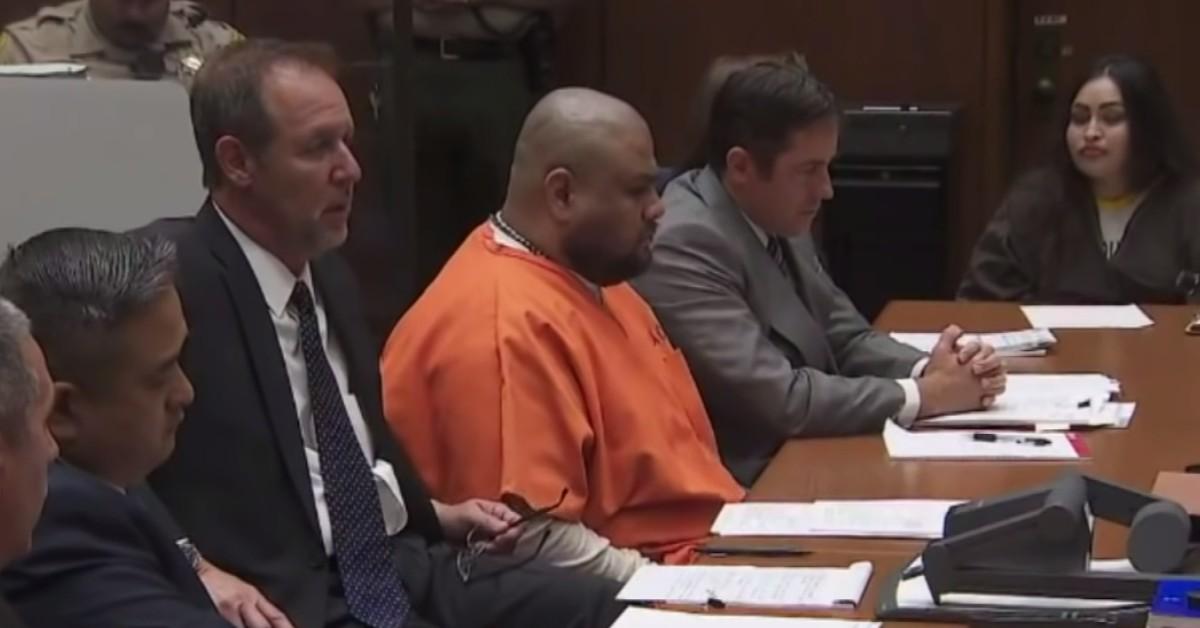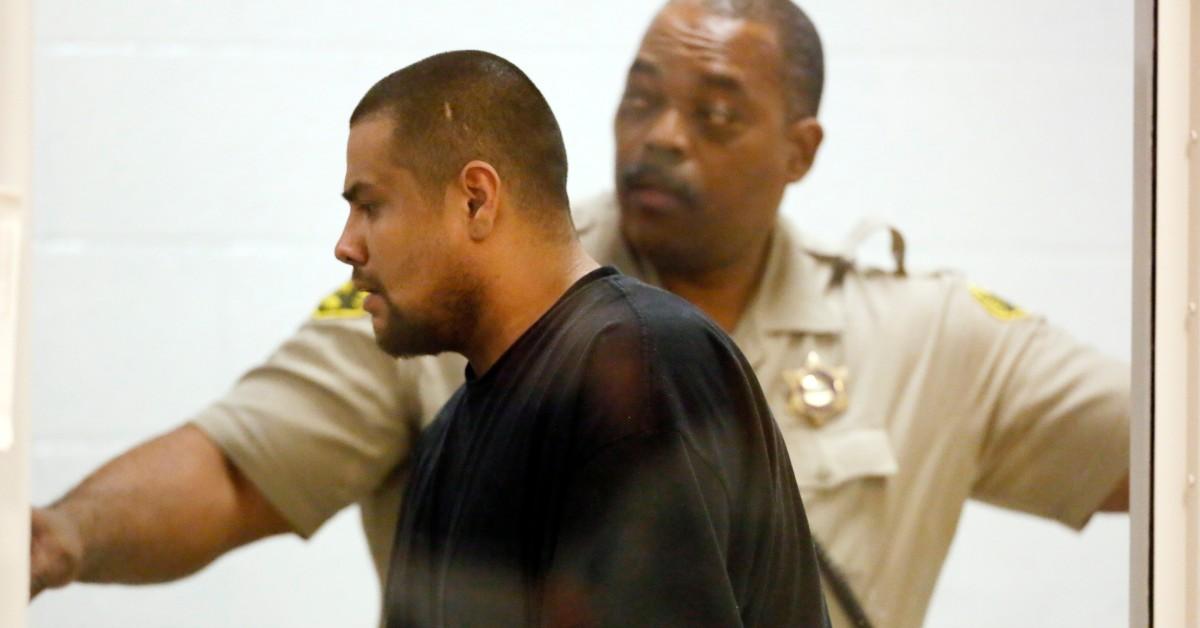Isauro Aguirre's Death Row Case: A Closer Look
In 1988, Isauro Aguirre was sentenced to death for the brutal murder of two Houston police officers. The case gained national attention due to Aguirre's claims of innocence and the questionable tactics used by the prosecution. Aguirre's case has raised important questions about the death penalty, prosecutorial misconduct, and the rights of the accused.
Aguirre's conviction was based largely on the testimony of jailhouse informant Walter Quijano, who claimed that Aguirre had confessed to the murders. However, Quijano's testimony has since been discredited, and Aguirre has maintained his innocence. In 2019, the Texas Court of Criminal Appeals granted Aguirre a new trial, ruling that the prosecution had withheld evidence that could have helped Aguirre's defense.
Read also:A Dive Into Lisa Vanderpumps Youthful Years Secrets Of Timeless Beauty
The Aguirre case is a reminder that the death penalty is irreversible. Once someone is executed, there is no going back. It is therefore imperative that we have a fair and just system in place to ensure that innocent people are not wrongfully convicted.
The Aguirre case has also highlighted the problem of prosecutorial misconduct. Prosecutors have a duty to seek justice, not simply to win convictions. When prosecutors engage in misconduct, it undermines the integrity of the justice system and can lead to innocent people being wrongfully convicted.
The Aguirre case is a complex and tragic one. It is a case that has raised important questions about the death penalty, prosecutorial misconduct, and the rights of the accused. It is a case that will continue to be debated for years to come.
Isauro Aguirre Death Row Case
The Isauro Aguirre death row case has raised important questions about the death penalty, prosecutorial misconduct, and the rights of the accused. Key aspects of the case include:
- Innocence claims: Aguirre maintains his innocence, despite being convicted based largely on the testimony of a jailhouse informant who has since recanted.
- Prosecutorial misconduct: The prosecution has been accused of withholding evidence that could have helped Aguirre's defense.
- Death penalty concerns: The case has highlighted the problems with the death penalty, including the risk of executing innocent people.
- Jailhouse informants: The use of jailhouse informants in criminal cases is controversial, as they have a history of providing false or unreliable testimony.
- Rights of the accused: The case has raised questions about whether Aguirre received a fair trial and whether his rights were violated.
- New trial granted: In 2019, the Texas Court of Criminal Appeals granted Aguirre a new trial, ruling that the prosecution had withheld evidence that could have helped Aguirre's defense.
- Ongoing debate: The Aguirre case is a complex and tragic one that will continue to be debated for years to come.
These key aspects underscore the importance of ensuring that our criminal justice system is fair and just, and that the death penalty is used only in the most egregious cases, with all possible safeguards in place to prevent the execution of innocent people.
1. Innocence Claims
Isauro Aguirre's innocence claims are a central aspect of his death row case and raise serious concerns about the reliability of jailhouse informant testimony. Aguirre has consistently maintained his innocence, despite being convicted largely based on the testimony of Walter Quijano, a jailhouse informant who has since recanted his testimony.
Read also:Jason Beghe Acclaimed Actor With A Distinguished Career
- The Problem of Jailhouse Informants
Jailhouse informants have a history of providing false or unreliable testimony in order to gain favor with law enforcement or improve their own legal . In Aguirre's case, Quijano had a history of mental illness and had previously provided false information to the police. - Aguirre's Credible Defense
Despite the prosecution's reliance on Quijano's testimony, Aguirre presented a credible defense at trial. He had alibi witnesses who placed him elsewhere at the time of the murders, and there was no physical evidence linking him to the crime. - Prosecutorial Misconduct
The prosecution's handling of Aguirre's case has also raised concerns about prosecutorial misconduct. The prosecution withheld evidence that could have helped Aguirre's defense, including Quijano's recantation. This raises questions about whether Aguirre received a fair trial. - Implications for the Death Penalty
Aguirre's case highlights the problems with the death penalty. If Aguirre is innocent, as he claims, then his execution would be a grave miscarriage of justice. This case underscores the need for a fair and just criminal justice system, with strong safeguards in place to prevent the execution of innocent people.
Aguirre's innocence claims are a powerful reminder that the death penalty is irreversible. Once someone is executed, there is no going back. It is therefore imperative that we have a fair and just system in place to ensure that innocent people are not wrongfully convicted.
2. Prosecutorial Misconduct
Prosecutorial misconduct is a serious problem that can lead to wrongful convictions and miscarriages of justice. In the case of Isauro Aguirre, the prosecution has been accused of withholding evidence that could have helped Aguirre's defense. This misconduct has had a profound impact on Aguirre's case and raises concerns about the fairness of his trial.
The prosecution's withholding of evidence in Aguirre's case is particularly troubling because it involves evidence that could have helped Aguirre prove his innocence. Aguirre has maintained his innocence since his arrest, and the withheld evidence could have supported his claims. This misconduct has therefore undermined Aguirre's ability to receive a fair trial and has put his life at risk.
The Aguirre case is not an isolated incident. Prosecutorial misconduct is a systemic problem in the United States, and it has led to the wrongful convictions of many innocent people. In order to ensure the fairness of our criminal justice system, it is essential that prosecutors are held accountable for their misconduct and that strong safeguards are put in place to prevent it from happening in the future.
The following are some specific examples of prosecutorial misconduct that have occurred in the United States:
- Withholding evidence from the defense
- Tampering with evidence
- Coercing witnesses to testify falsely
- Suppressing exculpatory evidence
- Making false or misleading statements to the court
These are just a few examples of the many ways in which prosecutors can engage in misconduct. When prosecutors engage in misconduct, they undermine the integrity of the justice system and make it more difficult for innocent people to receive a fair trial.
3. Death Penalty Concerns
The Isauro Aguirre death row case has brought to light serious concerns about the death penalty and the risk of executing innocent people. Here are some key points to consider:
- The Irreversibility of the Death Penalty
Once someone is executed, there is no going back. If it is later discovered that the person was innocent, there is no way to right that wrong. This is a major concern, as there have been numerous cases of people being wrongly convicted and sentenced to death. - The Risk of Racial Bias
Studies have shown that the death penalty is applied disproportionately to people of color. This raises concerns about racial bias in the criminal justice system and the possibility that innocent people are being sentenced to death simply because of their race. - The Lack of Deterrence
There is no evidence that the death penalty deters crime any more effectively than other forms of punishment. In fact, some studies have shown that the death penalty may actually increase crime rates.
The Isauro Aguirre case is a reminder that the death penalty is a flawed and unjust system. It is a system that risks executing innocent people, and it does not deter crime. It is time to abolish the death penalty and replace it with a more humane and effective form of punishment.
4. Jailhouse informants
The use of jailhouse informants in criminal cases is a controversial practice that has led to wrongful convictions and miscarriages of justice. Jailhouse informants are individuals who are incarcerated and provide information to law enforcement about other inmates in exchange for favorable treatment, such as a reduced sentence or better prison conditions.
- The Problem of False or Unreliable Testimony
Jailhouse informants have a history of providing false or unreliable testimony in order to gain favor with law enforcement or improve their own legal standing. This is because they have little to lose and much to gain by providing information, regardless of its accuracy. - The Case of Isauro Aguirre
The case of Isauro Aguirre is a prime example of the problems with jailhouse informants. Aguirre was convicted of murder based largely on the testimony of a jailhouse informant who has since recanted his testimony. Aguirre has maintained his innocence, and there is evidence to support his claims. However, the prosecution's reliance on the jailhouse informant's testimony has led to Aguirre being sentenced to death. - The Need for Caution
The case of Isauro Aguirre highlights the need for caution when using jailhouse informants. Prosecutors and law enforcement must carefully evaluate the credibility of jailhouse informants and their motives for providing information. Jailhouse informant testimony should never be the sole basis for a conviction, and it should always be corroborated with other evidence.
The use of jailhouse informants is a necessary evil in some cases. However, it is important to be aware of the risks involved and to take steps to minimize the potential for false or unreliable testimony. By carefully evaluating the credibility of jailhouse informants and corroborating their testimony with other evidence, we can help to ensure that innocent people are not wrongfully convicted.
5. Rights of the accused
The case of Isauro Aguirre has raised important questions about the rights of the accused and whether Aguirre received a fair trial. The prosecution's reliance on a jailhouse informant with a history of providing false testimony, as well as the withholding of evidence that could have helped Aguirre's defense, have led to concerns about the fairness of his trial.
The rights of the accused are essential to ensure that our criminal justice system is fair and just. These rights include the right to a fair trial, the right to counsel, the right to confront witnesses, and the right to be free from cruel and unusual punishment. When these rights are violated, it can lead to wrongful convictions and miscarriages of justice.
The case of Isauro Aguirre is a reminder that we must always be vigilant in protecting the rights of the accused. These rights are not just for the guilty, but for all of us. If we allow the rights of the accused to be eroded, then we are all at risk of being wrongly convicted.
6. New trial granted
The granting of a new trial to Isauro Aguirre is a significant development in his death row case and highlights the importance of ensuring that criminal trials are fair and just. The prosecution's withholding of evidence that could have helped Aguirre's defense raises serious concerns about the integrity of his trial and the possibility that he may have been wrongly convicted.
The new trial granted to Aguirre is a direct result of the ongoing efforts of his legal team to uncover evidence of prosecutorial misconduct and to challenge the reliability of the jailhouse informant testimony that was used to convict him. The fact that the Texas Court of Criminal Appeals has granted Aguirre a new trial is a testament to the strength of his legal arguments and the seriousness of the concerns that have been raised about his case.
The granting of a new trial to Aguirre is also a reminder that the criminal justice system is not always perfect and that wrongful convictions can occur. It is therefore essential that we have a system in place that allows for the review of cases where there is evidence of innocence or prosecutorial misconduct. The granting of a new trial to Aguirre is a positive step in ensuring that justice is served in his case.
The case of Isauro Aguirre is a complex and tragic one, but it is also a reminder of the importance of due process and the rights of the accused. The granting of a new trial to Aguirre is a sign that the justice system is working to correct its mistakes and to ensure that innocent people are not wrongfully convicted.
7. Ongoing debate
The ongoing debate surrounding the Isauro Aguirre case underscores the complexities and implications surrounding capital punishment, prosecutorial misconduct, and the rights of the accused. Several facets contribute to this ongoing debate:
- Reliability of Jailhouse Informants
The prosecution's reliance on a jailhouse informant with a history of providing false testimony has raised concerns about the reliability of such informants and the potential for wrongful convictions based on their testimony. - Prosecutorial Misconduct
Allegations of prosecutorial misconduct, including the withholding of evidence that could have aided Aguirre's defense, have fueled the debate about the fairness of his trial and the integrity of the criminal justice system. - Flaws in the Death Penalty System
The Aguirre case has highlighted concerns about the flaws inherent in the death penalty system, including the risk of executing innocent individuals and the lack of conclusive evidence supporting its effectiveness as a deterrent. - Importance of Due Process
The granting of a new trial to Aguirre emphasizes the significance of ensuring due process and protecting the rights of the accused, even in the face of serious allegations.
These facets collectively contribute to the ongoing debate surrounding the Isauro Aguirre case. They underscore the need for a thorough examination of the issues at hand, including the reliability of jailhouse informants, the ethical conduct of prosecutors, the fairness of the death penalty system, and the fundamental rights of individuals accused of crimes.
FAQs on Isauro Aguirre's Death Row Case
The case of Isauro Aguirre, sentenced to death for the murders of two Houston police officers, has garnered significant attention due to allegations of prosecutorial misconduct and concerns about the reliability of jailhouse informants. Here are answers to some frequently asked questions about the case and its implications:
Question 1: What are the key concerns surrounding the case?
The primary concerns center around the prosecution's reliance on a jailhouse informant with a history of false testimony and allegations that evidence potentially favorable to Aguirre's defense was withheld. These issues raise questions about the fairness of his trial and the integrity of the criminal justice system.
Question 2: Why is the reliability of jailhouse informants being scrutinized?
Jailhouse informants have a history of providing unreliable or false testimony to gain favor or improve their own legal standing. Their motives and credibility must be carefully assessed to minimize the risk of wrongful convictions based on their statements.
Question 3: What are the implications of prosecutorial misconduct allegations?
Prosecutorial misconduct, such as withholding evidence or knowingly using false testimony, undermines the integrity of the justice system and violates the rights of the accused. It can lead to wrongful convictions and erode public trust in the fairness of trials.
Question 4: How does the Aguirre case highlight flaws in the death penalty system?
The case underscores concerns about the death penalty's irreversibility and the risk of executing innocent individuals. It also raises questions about whether capital punishment effectively deters crime or aligns with contemporary societal values.
Question 5: What are the key takeaways from the ongoing debate surrounding the case?
The debate emphasizes the importance of due process, ensuring a fair trial for all individuals accused of crimes. It also highlights the need for transparency and accountability in the criminal justice system to prevent wrongful convictions and uphold the rights of the accused.
The ongoing discussions and legal proceedings surrounding Isauro Aguirre's case serve as a reminder of the complexities and implications in matters of capital punishment, prosecutorial conduct, and the rights of the accused within the criminal justice system.
Transition to the next article section:
Conclusion
The case of Isauro Aguirre, a man sentenced to death for the murders of two Houston police officers, has brought to light critical issues within the criminal justice system. The concerns surrounding the reliability of jailhouse informants, the potential for prosecutorial misconduct, and the inherent flaws in the death penalty system have been thrust into the spotlight.
The ongoing debate surrounding Aguirre's case serves as a catalyst for re-evaluating the fairness and integrity of our justice system. It underscores the need for robust safeguards to prevent wrongful convictions, the importance of transparency and accountability in prosecutorial practices, and the necessity of thoughtful consideration regarding the morality and efficacy of capital punishment.
The legal proceedings and public discourse surrounding Isauro Aguirre's case will undoubtedly continue, shaping the future of criminal justice practices and policies. This case stands as a stark reminder of the complexities involved in matters of life and death, demanding our unwavering commitment to ensuring a just and equitable system for all.


